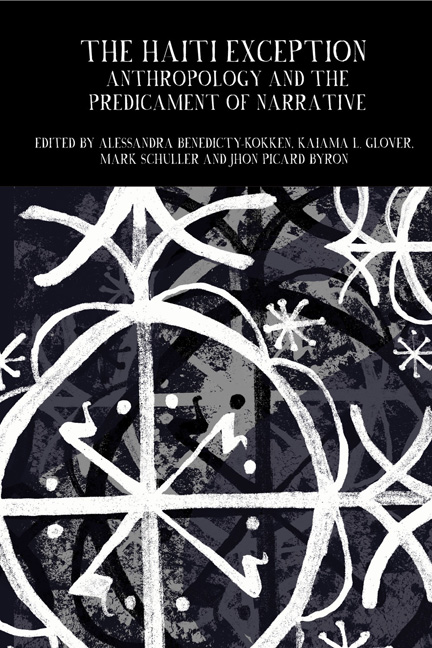Book contents
- Frontmatter
- Contents
- Editors’ Introduction
- I Tracing Intellectual Histories
- II Interrogating the Enquiring Self
- III On Nation-Building: Histories, Theories, Praxes
- Haiti, Politics and Sovereign (Mis)recognitions
- Haitian Culture in the Informational Economies of Humanitarian Aid
- Urban Poetics
- Epilogue: Kalfou Danje: Situating Haitian Studies and My Own Journey within It
- Notes on Contributors
- Index
Urban Poetics
from III - On Nation-Building: Histories, Theories, Praxes
- Frontmatter
- Contents
- Editors’ Introduction
- I Tracing Intellectual Histories
- II Interrogating the Enquiring Self
- III On Nation-Building: Histories, Theories, Praxes
- Haiti, Politics and Sovereign (Mis)recognitions
- Haitian Culture in the Informational Economies of Humanitarian Aid
- Urban Poetics
- Epilogue: Kalfou Danje: Situating Haitian Studies and My Own Journey within It
- Notes on Contributors
- Index
Summary
A hostile city?
On 12 January 2010, an earthquake of 7.0 magnitude on the Richter scale shakes Port-au-Prince to its very foundations. The suddenness and scale of the disaster is unprecedented. Total destruction of the capital's nerve centres and of the countless surrounding neighbourhoods and slums, all built without any regard for basic standards of safety, of decency. The toll is heavy, very heavy. Massive loss of life. Utter physical and financial devastation within the space of thirty-six seconds. Complete disorientation. Strange feeling that the symbolic order of this intense living space has been permanently disordered, its landmarks no longer recognizable amid the churches, temples, prison, morgue, public squares, schools, universities, markets, shops, etc.
The initial shock should have opened the way to a paradigmatic transformation in order to rethink the city. An audaciously inclusive city. But to do that we would have had to face one another, talk, debate, argue, do away with our old demons and reclaim our common ground. For the great Caribbean poet Aimé Césaire, the formidable citadel built by King Christophe at the dawn of Haiti's independence was intended as the unique and powerful expression of a people standing tall against the will of the imperial West to bring it to its knees. Thus, in the wake of the earthquake, we, as a people finally defeated, needed to imagine the capital city of a nation back on its feet (Césaire, 1963: 63).
Yet, in January 2010, the authorities at the highest level were silent, speechless, as if paralyzed. The words called for, hoped for, expected, never came. This silence was perceived as an unacceptable indifference, guilty powerlessness and even contempt. Our disappointment, equalled only by our uncertainty, translated into the worried sense that there would be no new direction, no new city, no rallying of what was left of our energy and our creativity to dream up a different, more humane city – that once again we would be left to get by as best we could, with the limited means available to us. An ‘every man for himself’ buttressed by the good and less good intentions of international aid, with its many faces and conflicting actions.
- Type
- Chapter
- Information
- The Haiti ExceptionAnthropology and the Predicament of Narrative, pp. 177 - 192Publisher: Liverpool University PressPrint publication year: 2016

